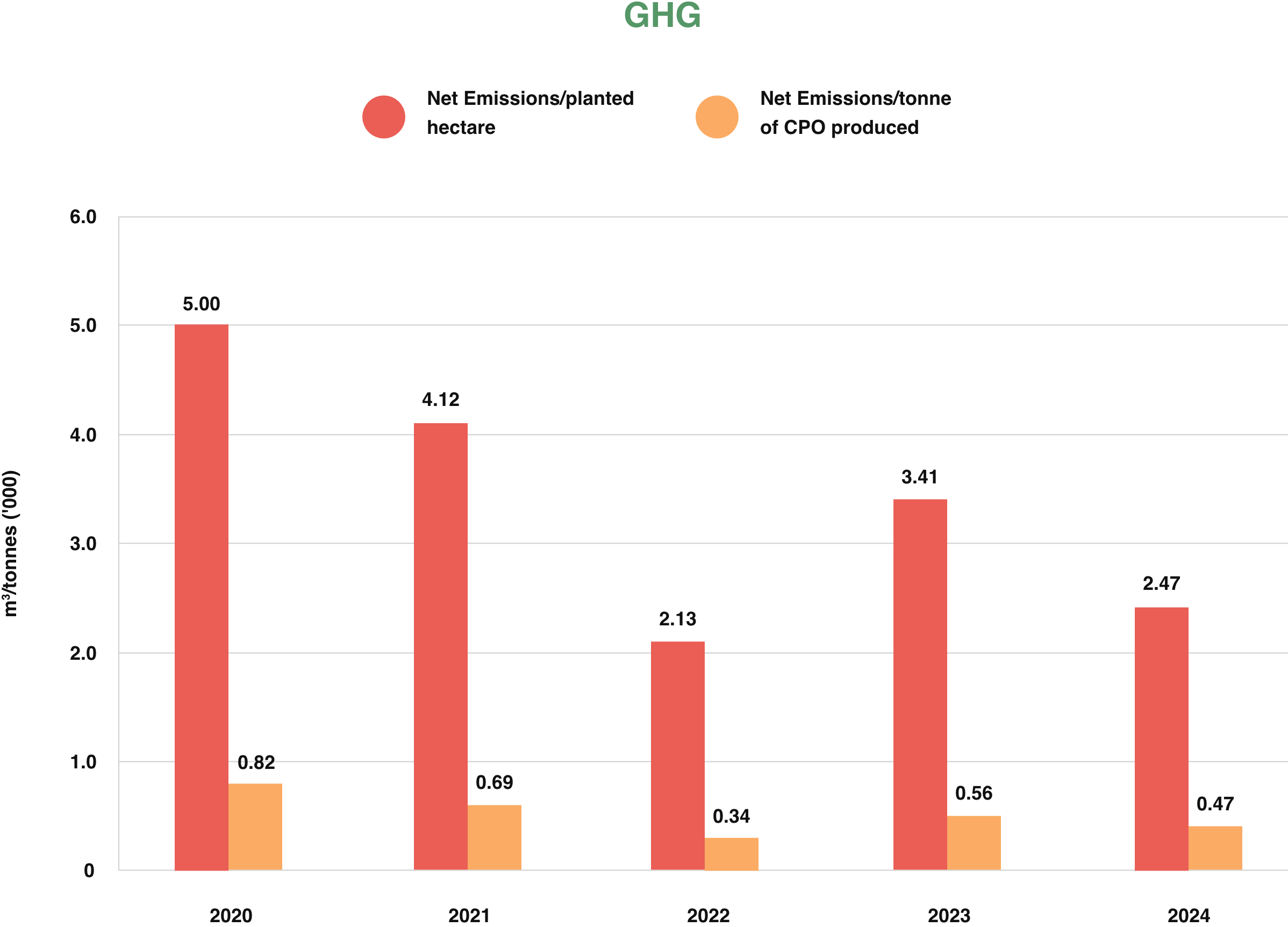Climate Action


Climate Action
Action today for a climate-resilient tomorrow
As a plantation company operating in an industry with significant land footprint, REA understands the critical role we play in addressing climate change.
Climate Action is our commitment to addressing the pressing challenges of climate change through measurable and impactful initiatives. This pillar focuses on reducing greenhouse gas emissions, optimising energy use, and implementing renewable energy solutions such as methane capture. By prioritising low-carbon operations and fostering resilience within our supply chain, we aim to contribute to a more sustainable and climate-resilient future.
Our Commitment
We are committed to ambitious climate action goals aimed at minimizing our carbon footprint and ensuring long-term sustainability:

By 2030, we aim to reduce our net greenhouse gas (GHG) emissions by 50% compared to our 2020 baseline.

Our goal is to achieve net-zero emissions by 2050, aligning with global climate objectives.

We prioritise transparent carbon accounting by consistently publishing our emissions data under-recognised frameworks, including RSPO PalmGHG, ISCC, and SECR, to facilitate ongoing improvement and build stakeholder trust.
Scope 1: Direct Emissions
Scope 1 emissions originate from activities directly under REA’s operational control. These include:

Land-Use Change and Plantation Activities
Emissions from land conversion, soil management, and fuel combustion in plantation operations.

Processing and Mill Operations:
Emissions generated from the combustion of biomass and fossil fuels used to create steam and electricity for our milling processes.

Transportation
Emissions from company-owned vehicles and ships transporting fresh fruit bunches (FFB) and refined palm oil products.
Scope 2: Indirect Emissions
Scope 2 emissions are generated from the energy we purchase and consume. These include:

Electricity for Facilities
Using grid electricity to power mills, our offices, and other operational facilities.

Purchased Steam
For specific processing requirements within our operations.
Scope 3 Emissions: Indirect Emissions Across Our Value Chain
Scope 3 emissions include indirect emissions that occur throughout our value chain, but REA does not directly control them. These emissions can be divided into two main categories:

Upstream Emissions
- Supplier Activities: This includes emissions linked to land-use changes, agricultural inputs like fertilisers and pesticides, and the transportation of raw materials by external suppliers.
- Contractors and Third-Party Transport: Emissions from contractors involved in plantation operations and the transport of goods.

Downstream Emissions
Distribution and Refining: Emissions from the transportation and processing of palm oil products by buyers and refiners.
Scope 3 emissions constitute the majority of our overall carbon footprint, emphasizing the necessity of collaborating with our suppliers and partners. It is crucial to implement sustainable practices and uphold our No Deforestation, No Peat, No Exploitation (NDPE) policy.
We are actively working to reduce both direct emissions (Scope 1) and indirect emissions from energy consumption (Scope 2) through a variety of initiatives:
- Sustainability Certifications: We follow frameworks such as RSPO, ISCC, and SECR to guide our emissions reduction strategies.
- Sustainable Good Agricultural Practices (GAPs): We prioritise efficient fertiliser application, enhance soil health, and reduce emissions from peatlands.
- Circular Economy Initiatives: We repurpose mill by-products, such as empty fruit bunches (EFB), for organic fertilizer and energy generation.
- Water and Waste Management: Enhanced irrigation systems, water storage, and responsible waste management to support resilient plantation systems.
- Renewable Energy Initiatives:
- Methane Capture Facilities: We operate two methane capture that capture methane and convert it into renewable energy, reducing emissions and providing power to our operations and local communities.
- Energy Efficiency: Using renewable energy to lessen reliance on fossil fuels and enhance local energy resilience.
REA is committed to reducing indirect emissions (Scope 3) by engaging with our supply chain:
1. Land Use Change Monitoring
We work to prevent deforestation and promote sustainable land management among our suppliers.
2. Smallholder Collaboration
We support smallholders by providing training and resources to smallholders, helping them adopt practices that align with our sustainability policies.
In 2024, our total net greenhouse gas (GHG) emissions were recorded at 89,876 tCO2eq, which represents a reduction of 25.6% from the previous year, 2023.
Net Emissions decreased due to a significant reduction in fertiliser use, reflecting the switch from single fertilisers (Urea, MOP, KCP, RP) to compound fertilisers (NPK), a decrease in third-party FFB, and a reduced loss of stored carbon due to biomass and land clearing.
- Per planted hectare
Decreased from 3.04 tCO2eq in 2023 to 2.21 tCO2eq in 2024. - Per tonne of CPO produced
Increased from 0.56 tCO2eq in 2023 to 0.46 tCO2eq in 2024.

For more detailed information on the calculation of GHG emissions on a group and individual mills basis, click here.
At REA, we recognise the importance of forests and biodiversity in mitigating climate change, supporting ecosystems, and promoting sustainable development. Our comprehensive strategy for protecting and managing forests and biodiversity focuses on reducing emissions, enhancing ecosystem resilience, and fostering sustainability through targeted programmes and partnerships.
1. NDPE Policy
We maintain a strict NDPE policy to ensure a deforestation-free supply chain, protecting vital forest ecosystems and preventing the conversion of peatlands. For more information, read here.
2. Deforestation Monitoring
We utilise satellite monitoring and conduct field audits to ensure oil palm activities across our operations do not involve deforestation. For more information, read here.
To offset emissions within our operations, we focus on:
1. Forest Conservation and Reforestation
We have designated 17,990 hectares as conservation reserves and are restoring degraded landscapes to enhance carbon sequestration.
2. High Conservation Value (HCV) Areas
Identifying and managing HCV areas to protect biodiversity and maintain ecological balance.
3. Methane Capture
Leveraging methane capture facilities to reduce GHG emissions.
We prioritise the protection of biodiversity within and around our plantations through:
1. Biodiversity Monitoring Programs
Regular monitoring to track species populations and habitat conditions.
2. Wildlife Patrols
Implementing patrol systems to prevent illegal hunting, logging, and encroachments into protected areas.
For more information, read here.
REA has developed a structured implementation strategy that addresses climate risks and opportunities:
Waste Management
- Partnering with the University of Mulawarman to improve research efforts aimed at preventing diseases in oil palm and ensuring the health of plantations.
- Repurposing mill byproducts, such as empty fruit bunches (EFB) and other organic materials, to create nutrient-dense organic fertilizers that foster sustainable farming practices.
- Transforming waste into protein sources through the use of black soldier fly larvae supports resource efficiency and environmentally friendly waste management strategies.
Driving a Circular Economy
- Supporting projects that repurpose by-products, such as fibres, into eco-conscious materials such as toothbrushes, showcasing the potential of palm oil waste in innovative applications.
- We are committed to implementing resource-efficient practices that reduce waste and enhance sustainability across all our operations.
Resilient Infrastructure
- Upgrading roadways, drainage systems, and water management infrastructure to withstand extreme weather conditions, such as heavy rains and heat waves.
- Improving water stewardship programs to guarantee effective irrigation and reliable storage during times of drought.
Land Management
- Enhancing soil resilience through optimising methods for water retention and nutrient storage, enabling plantations to thrive under variable weather patterns.
- Partnering with researchers and professionals in the industry to implement effective strategies for managing soil and ecosystems.
Measuring Progress
We track and disclose our emissions aligned to globally recognised methodologies:
- RSPO PalmGHG Tool: This tool employs a lifecycle assessment approach to capture emissions from cultivation to processing.
- SECR Framework: Covers Scope 1 and 2 emissions from global operations, ensuring transparency and accountability.
- ISCC Certification: Independent verification of our sustainability performance across the entire supply chain.
Waste Management
- Partnering with the University of Mulawarman to improve research efforts aimed at preventing diseases in oil palm and ensuring the health of plantations.
- Repurposing mill byproducts, such as empty fruit bunches (EFB) and other organic materials, to create nutrient-dense organic fertilizers that foster sustainable farming practices.
- Transforming waste into protein sources through the use of black soldier fly larvae supports resource efficiency and environmentally friendly waste management strategies.
Driving a Circular Economy
- Supporting projects that repurpose by-products, such as fibres, into eco-conscious materials such as toothbrushes, showcasing the potential of palm oil waste in innovative applications.
- We are committed to implementing resource-efficient practices that reduce waste and enhance sustainability across all our operations.
Resilient Infrastructure
- Upgrading roadways, drainage systems, and water management infrastructure to withstand extreme weather conditions, such as heavy rains and heat waves.
- Improving water stewardship programs to guarantee effective irrigation and reliable storage during times of drought.
Land Management
- Enhancing soil resilience through optimising methods for water retention and nutrient storage, enabling plantations to thrive under variable weather patterns.
- Partnering with researchers and professionals in the industry to implement effective strategies for managing soil and ecosystems.
Measuring Progress
We track and disclose our emissions aligned to globally recognised methodologies:
- RSPO PalmGHG Tool: This tool employs a lifecycle assessment approach to capture emissions from cultivation to processing.
- SECR Framework: Covers Scope 1 and 2 emissions from global operations, ensuring transparency and accountability.
- ISCC Certification: Independent verification of our sustainability performance across the entire supply chain.
At REA, managing climate-related risks is integral to our sustainability strategy. Guided by the Taskforce on Climate-related Financial Disclosures (TCFD) framework, we proactively identify, assess, and mitigate climate impacts to enhance resilience and ensure sustainable growth for our operations, communities, and the environment.
1. Leadership Accountability
The Managing Director, President Director, Board of Directors, and Chief Sustainability Officer (CSO) oversee our climate strategies and ensure climate risks are prioritised alongside business objectives and goals.
2. Integrated Decision-Making
Climate-related matters are regularly discussed in monthly operational management meetings with department heads, ensuring that risk identification and mitigation are embedded in operational strategies.
We employ a range of tools and methodologies to identify and mitigate climate-related risks posed by climate change:
Geospatial Analysis
- Steep Terrain Assessment
Complying with RSPO guidelines, we are committed to not plant on steep terrain to prevent soil erosion and nutrient loss. - Risk Mitigation Plans
Strategies based on topographic mapping reduce environmental impacts, including flood risks, soil erosion and loss of nutrients.
Hydrology Assessments
- Independent Studies
External hydrological assessments, due for completion in early 2025, analyse water levels and flooding impacts on operations, communities, and the landscape. - Flood Mitigation
Insights from these studies guide improvements to drainage systems and water management practices.
Satellite Monitoring
- Encroachment Detection
Satellite data, verified by external partner Satelligence, helps us identify forest loss and mitigate risks like erosion and shallow water stream flooding. - Conservation Efforts
Regular monitoring supports effective land use and biodiversity conservation strategies.
Land Use Planning
- Field Surveys and Assessments
Detailed land use plans for each concession in alignment to RSPO’s NPP and group policies, including Environmental Impact Assessments (EIAs), High Conservation Value (HCV) assessments, carbon stock assessments and, where required, hydrological assessments.
Geospatial Analysis
- Steep Terrain Assessment
Complying with RSPO guidelines, we are committed to not plant on steep terrain to prevent soil erosion and nutrient loss. - Risk Mitigation Plans
Strategies based on topographic mapping reduce environmental impacts, including flood risks, soil erosion and loss of nutrients.
Hydrology Assessments
- Independent Studies
External hydrological assessments, due for completion in early 2025, analyse water levels and flooding impacts on operations, communities, and the landscape. - Flood Mitigation
Insights from these studies guide improvements to drainage systems and water management practices.
Satellite Monitoring
- Encroachment Detection
Satellite data, verified by external partner Satelligence, helps us identify forest loss and mitigate risks like erosion and shallow water stream flooding. - Conservation Efforts
Regular monitoring supports effective land use and biodiversity conservation strategies.
Land Use Planning
- Field Surveys and Assessments
Detailed land use plans for each concession in alignment to RSPO’s NPP and group policies, including Environmental Impact Assessments (EIAs), High Conservation Value (HCV) assessments, carbon stock assessments and, where required, hydrological assessments.
For more details on the climate-related risks and opportunities, please refer to our Annual Report here.
Certifications and external audits reinforce our commitment to managing climate-related risks:
1. RSPO Certification
100% of our mills are RSPO-certified, requiring comprehensive climate risk assessments, including AMDAL, EIAs, HCV, and High Carbon Stock (HCS) assessments.
2. Third-Party Audits
Independent licensed assessors audit our operations to ensure compliance with sustainability standards. Click to view the public summary reports on REA’s certified operations, land use, HCV and HCS for CDM, KMS and PU.